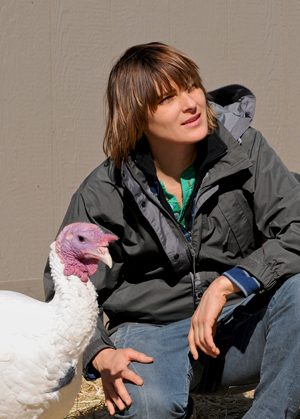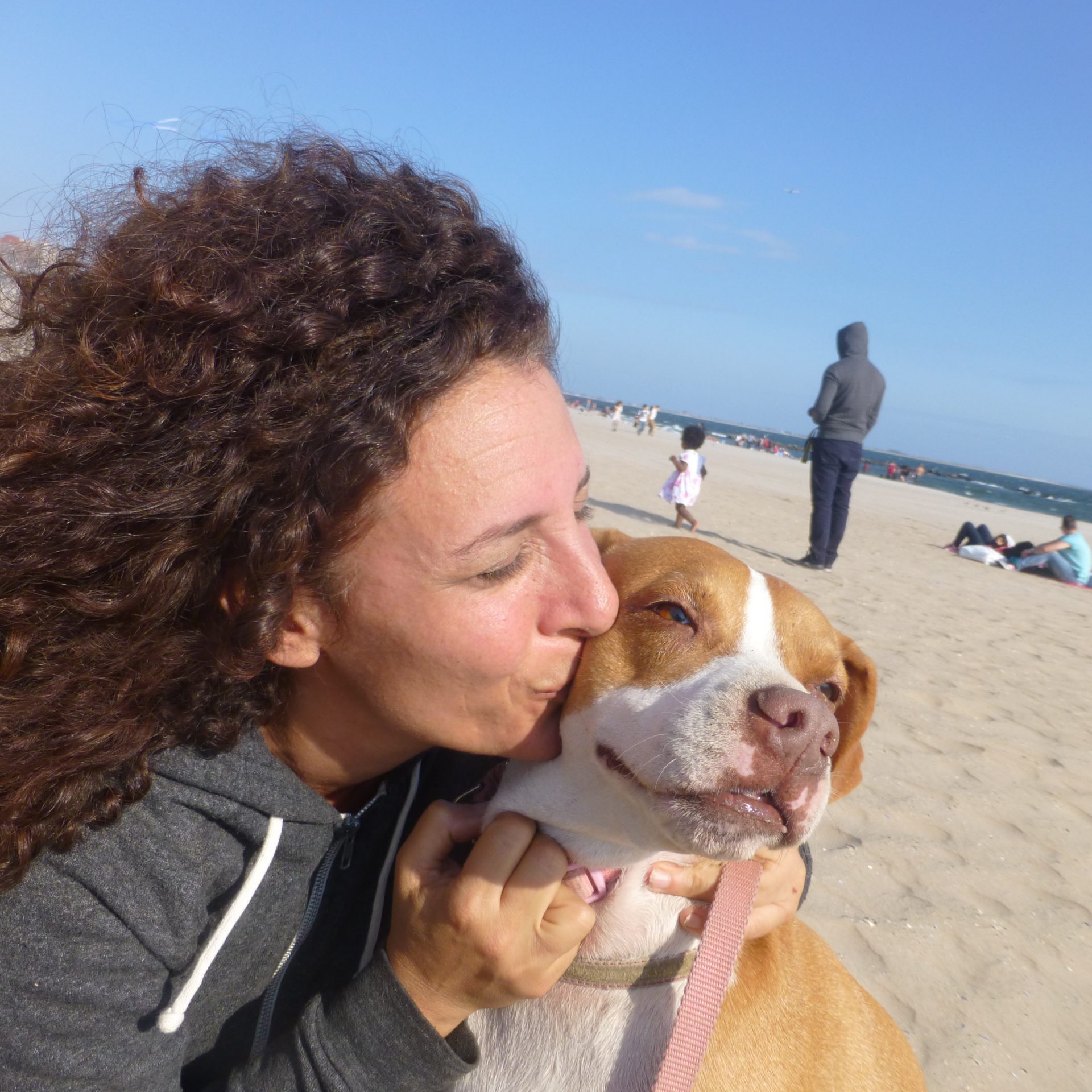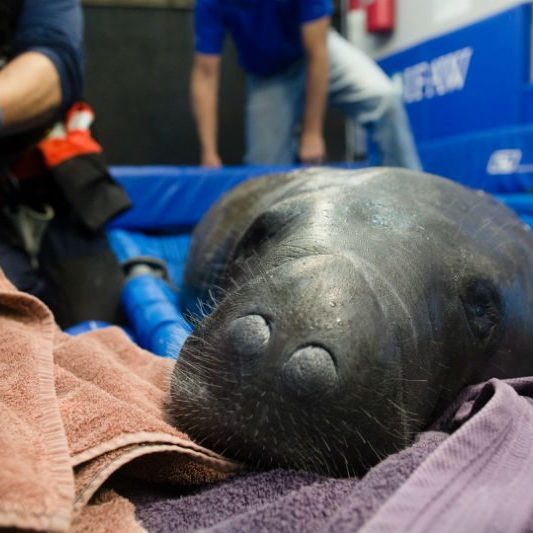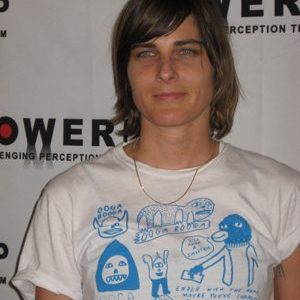
A Thanksgiving that’ll change and save lives.
You might know her best as Max, the person whose gender odyssey ignited fires of debate on The L Word for five seasons, but actor Daniela Sea is so much more. An artist who published her own poetry lived as a man in India for a year and spent a year performing sold-out shows from chichi galleries to punk house basements with her friends in a band called the Thorns of Life, Sea is also a tireless advocate for animal rights.
Sea will be joining musician Jonathan Richman to help Farm Sanctuary—the nation’s leading farm animal protection organization—host their annual compassionate Thanksgiving Celebration FOR the Turkeys, which will be held at their Orland, Calif., shelter on November 21.
The annual event features a full Thanksgiving celebration replete with a candlelit gourmet vegan dinner and another holiday fare, entertainment and a silent auction to benefit the sanctuary’s rescued animals. In addition to Sea, there will also be presentations from Farm Sanctuary California shelter director Leanne Cronquist, cookbook author Colleen Patrick-Goudreau and Farm Sanctuary president and co-founder Gene Baur. The best part of the annual event for many attendees is the happy-making annual “Feeding of the Turkeys” ceremony, where guests actually treat delighted turkeys to a feast of squash, pumpkin pie and cranberries.
Farm Sanctuary has been the nation’s leading farm animal protection organization since 1986. In addition to research and investigations, legal reform and public awareness projects, they are best known for their rescue and refuge efforts. Farm Sanctuary shelters in Watkins Glen, N.Y., and Orland, Calif., provide lifelong care for hundreds of rescued animals. Among those rescued? Over 1,000 turkeys, who, through the Adopt-a-Turkey Project, have been placed into loving homes through their annual Turkey Express adoption event, which educates people about the plight of commercially-raised turkeys by offering a compassionate alternative for Thanksgiving.
For the last year and a half Sea has been working on a project she’s really excited about: “A film I will direct and act in, which I’ve written with an amazing writer, Cami Delavigne, who wrote the script for Blue Valentine, which will premiere at Sundance this year,” she says. “I’ve immersed myself in this project, focusing on learning how to craft a story and I’m really excited about bringing it to film.” We caught up with the new filmmaker to ask her about Farm Sanctuary, T-birds and what’s on her Thanksgiving menu.
Have you worked with Farm Sanctuary before?
I’ve been working with Farm Sanctuary for the past two years. They are one of my favourite direct action organizations.
What made you get involved and how important is the work that they do?
They’ve done so much good for animals, humans and the planet in the 20-plus years they’ve been at it. Working with them gives me a chance to be a part of changing things that I strongly believe need to be changed, in a very practical way. They do amazing work that goes with my beliefs about animals, sustainability and kindness. Animals feel things and deserve to live in dignity and free from abuse and suffering. Factory farming is the biggest cause of greenhouse gasses. I like to breathe, I love animals and I want our species to live for a long time.
I love their Adopt-a-Turkey Project. Do you think fewer people would eat commercially-raised turkeys if they understood what they really go through?
If people knew how personable and fun to hang out with turkeys are and if they knew the horrors that turkeys on factory farms go through for their entire lives, I think fewer people would want to take part in it.
I know you don’t eat animals, so what’s on your Thanksgiving menu?
However hypocritical Thanksgiving may seem to be—given the history of bloodshed and colonization that promptly followed that first Thanksgiving long ago—I have come to like Thanksgiving. I love cooking and being with my family. My mom makes a delicious nut loaf, and I make a pretty good tofu pumpkin pie that my best friend Miriam invented.
How has your family responded to you being vegan?
Over the years, my grandma has grown used to my making the vegan version of Thanksgiving dinner. I don’t lecture anyone about factory farming over a holiday meal, but my eating the way I do is always cause for someone to start a conversation about why. I’m usually direct and brief about it, and the result has been that now the meat-eaters in my family usually buy meat that’s been raised outside and has been allowed to live some kind of life outside of a cage. Every step counts, I think.
I’m not vegan but I don’t eat factory-farmed meat. Any advice on educating my friends on factory farming?
It’s overwhelming sometimes to know how we can help make the world a better place. One of the most effective and powerful ways we can make a difference is in our choices of what we buy, eat and consume. A simple choice at the grocery store really does make a huge difference.
What are a few reasons why we should not support factory farming?
For our planet, the United Nations says animal agriculture is one of the leading causes of greenhouse gas emissions, ahead of all transportation combined. What? That’s right! It’s less important what or if you drive than what you choose to eat. Also, valuable water and land resources are wasted for meat production, while the planet’s 800 million malnourished people could be fed if these resources were used to produce plant foods.
For our health, a plant-based diet, if done with care, is less expensive and, I would argue, more nutritious than one that includes factory-farmed meat.
For animals, if you’ve ever cuddled up to a pig or had a chicken sit in your lap and let you pet it, you know what I mean when I say, animals are my friends. Why would I want to be cruel to them? Farm animals are excluded from state and federal anti-cruelty laws. As a result, calves, pigs and chickens are confined in crates or cages so small, they cannot even turn around. Every year in the United States, billions of farm animals suffer and die under conditions considered so cruel, they have been banned in other countries. Tough facts, but knowing this makes my vegetable soup taste even better.
That’s a good point.
A lot of times people talk about the tradition of eating meat. The way almost all meat is produced in the U.S. has absolutely nothing to do with this tradition. Factory farms are really different from the way we imagine a farmer and a big grassy field with cows calmly grazing, who one day meet their fate. Pigs, arguably one of the most intelligent species, are kept in cages for most of their lives that prevent them from even turning around. They are literally driven mad. Poultry—chickens, turkeys and ducks—are specifically excluded from the Federal Humane Slaughter Act, meaning they have no federal protections from birth to slaughter. These beings are given loads of antibiotics all of their lives to allow them to live in such inhumane and unhealthy conditions.
That’s so crazy. Where can readers get more info?
There’s a lot of places you can go to find out about factory farming. If you search on YouTube for “Ellen interviews Jonathan Saffron Foer,” you’ll see a great and concise conversation about his new book, Eating Meat. There’s always the PETA website, and many people I know who became vegetarian did so after watching a short video called, Meet Your Meat, all about the truth of factory farming. Gene Bauer, the founder of Farm Sanctuary, has written a great book about his journey over the past many decades, simply called Farm Sanctuary.
Thanksgiving FOR the Turkeys: The Deets
WHEN: Saturday, November 21, 2009; 12:30 p.m. for guest registration
WHERE: Farm Sanctuary, 19080 Newville Rd., Orland, Calif.
COST: $75 per person
NOTE: There will be complimentary Thanksgiving-themed tours on Sunday, November 22. Tours will be every hour on the hour from 11 a.m.–3 p.m., departing from the People Barn.
RESERVATIONS: Reservations can be made online at adoptaturkey.org or by calling 607-583-2225 ext. 221. Space is limited, so reserve now. The deadline is November 13. We regret that we may be unable to accommodate reservations received after the deadline. Confirmation and directions will be sent to all registrants.
ADDITIONAL INFO: Can be found at farmsanctuary.org or by calling 607-583-2225. You can also follow Farm Sanctuary at twitter.com/FarmSanctuary.



